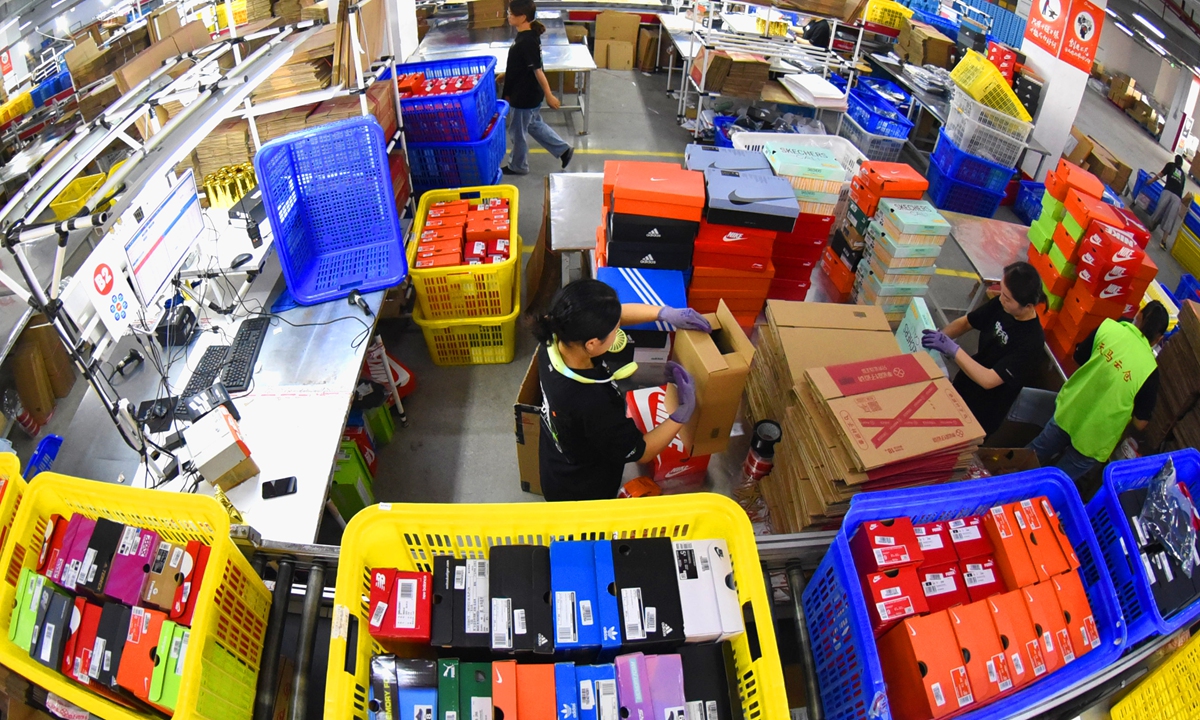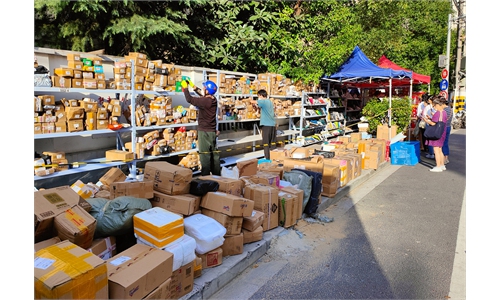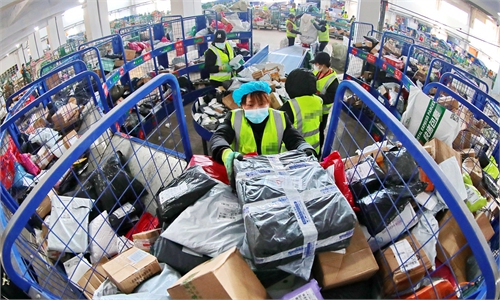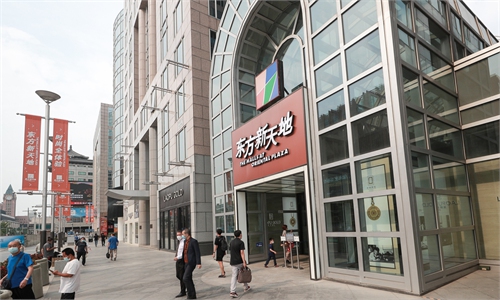Chinese consumers splurge on ‘quality life’ goods during middle-year shopping festival, rising spending a major boost to growth confidence

Staff at an industry zone in Lianyungang, East China's Jiangsu Province sort packages on Friday, the day China's major e-commerce platforms including JD and Alibaba's Tmall celebrate this year 618 mid-year shopping festival. Photo: VCG
China is ushering in a hot season for consumption as time approaches the end of the middle-year June 18 shopping festival, often considered China's second largest online shopping carnival apart from the Double 11 online festival, with many products ranging from tea to pet intelligent devices seeing sales more than double on various e-commerce platforms.
The trend of Chinese consumers willing to spend money after their shopping activities were more or less suppressed during the recent coronavirus crisis, sounds the bugle for a steady economic growth in China after the coronavirus resurge was contained, with experts predicting that consumption might achieve positive growth in 2022, while the country has ample chances to achieve its economic growth target of about 5.5 percent set at beginning of this year.
China's short video platform Kuaishou was the first among major internet platforms to launch the June 18 shopping festival on May 20. It was followed by many platform companies like JD.com, Tmall and Douyin. According to data revealed by some of those platforms, many products reported a boom this year.
For example, presale revenues of JD.com's home electric appliances surged by 270 percent year-on-year on May 23, the first day of JD.com's 2022 June 18 online shopping spree. Cosmetics products' presales also reached about 7.7 billion yuan ($1.15 billion) from 20:00 pm on May 26 to midnight of May 28 on Tmall.com, up 20 percent compared with the first three days of last year's festival on Tmall.com.
A Shanghai-based resident surnamed Dai told the Global Times on Friday that she bought some pet food and a pet dispenser during the June 18 festival. Having been confined to home for more than two months due to the coronavirus lockdown, she said she couldn't wait to replenish daily articles now that delivery is back to normal.
"I don't care too much about the discounts. I just buy things because I need them," the person said.
The online platforms' data also showed that some home products are growing increasingly popular amid the fight against the coronavirus. According to a report sent by Alibaba to the Global Times, e-sports chair became a hot product, as about 300,000 of those chairs were sold during this year's June 18 festival. Pet smart devices also saw a surge in sales of about 150 percent year-on-year, the report showed.
Data provided by JD.com also showed Chinese people's appetite for a "quality life," with sales of tea surging by more than 180 percent, while sales of hotpot seasoning rose by nearly 40 percent.
The rising spending is not only a natural recovery after measures to control the coronavirus were successful, but also an instant result of the government and the companies' rollout of multiple policies to stimulate consumption. Tmall, for example, rolled out the biggest discount since 2018. Pinduoduo.com also provided 10 billion yuan in subsidies to stimulate consumption during the middle-year online shopping festival.
The central and local governments also launched a series of measures to boost consumption recovery. The State Council rolled out an opinion document in April which noted that the country should stabilize the "basic plate" of consumption.
Many local governments also took action. The Shenzhen city government, for example, rolled out subsidies up to 2,000 yuan per person for consumers who buy home electric appliances.
Yao Yang, director of the China Center for Economic Research at Peking University, said at a summit that issuing consumption coupons can directly drive up consumption, and its pulling effect on economic recovery should be the "most direct," according to a report published by ifeng.com on Friday.
According to Yao, if each person gets 1,000 yuan in consumption coupons, they may spend about 3,000-4,000 yuan in total. This could amount to about 2-3 trillion yuan in incremental economic value, which accounts for about 2-3 percent of GDP volume, a "very large number," he said. Experts said that the June 18 online festival should inject extra vitality into China's consumption sector, which has passed the low ebb and is recovering in an orderly manner.
In May, China's retail sales of consumer goods plunged by about 6.7 percent on a yearly basis to 3.35 trillion yuan, compared with 11.1 percent drop in April.
"A single June 18 festival's ability to drive up China's macro consumption data should be limited, but its function in driving up people's confidence in China's macroeconomic growth is limitless," Chen Jia, a research fellow at the International Monetary Institute of the Renmin University of China, told the Global Times on Friday.
According to Chen, it is an appropriate move by online platforms to "grasp the basic plate of consumption" by such action as rolling out discount policies, when some of their investment and business sectors were restricted. "It would not only help the platforms boost investors' confidence and stabilize their income, but would benefit their strategy shift to better adapt to China's industrial chain upgrading trend," Chen said.
Tian Yun, a veteran economist, also told the Global Times on Friday that he predicted that China's consumption decline would further narrow to about 3 percent in June. In 2022, retail sales could rise by about 1-2 percent.
"It's often a trend that consumption recovery is slower than production recovery after coronavirus epidemic. In 2022, consumption should be able to recover to about the level in the second half of 2020, but a full recovery should take more time as many consumption sectors like tourism are still being restricted," Tian said.
Experts stressed that the vitality signs in the consumption sector are also a positive signal of China's general economic situation, which is on the way to a healthy rebound and is expected to make great contributions to the world economy this year despite a somewhat chaotic external environment.
According to Chen, the macroeconomic data in May including trade, consumption and investment shows that China's economy is on a path to a stable recovery.
In particular, the unexpectedly positive trade data not only shows the world's trade partners' recognition of China's economic resilience, but is a superb bonus to China's further economic stabilization, especially stabilization of the consumption sector, he said.
"China still has very big space to achieve its economic growth target of about 5.5 percent set around the beginning of this year," Chen noted.




